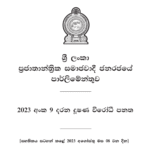Case Title: Azem Morina v. Saman Weranjan Kasthurirathna and Tea Masters Ceylon (Pvt) Ltd
Case Number: SC CHC Appeal 10/2015
Court: Supreme Court of Sri Lanka
1. Case Overview:
Parties Involved:
- Plaintiff-Appellant: Azem Morina, a foreign national and resident of Kosovo.
- Defendants-Respondents:
- Saman Weranjan Kasthurirathna, a Sri Lankan individual.
- Tea Masters Ceylon (Pvt) Ltd, a company based in Sri Lanka.
Nature of the Case: This case concerns a failed commercial transaction involving the export of tea. The Plaintiff-Appellant sought to recover funds remitted to the Defendants-Respondents, along with interest and damages for additional expenses incurred due to the breach of agreement.
Primary Claims:
- Rs. 5,557,238 as interest on the principal sum of €37,960 remitted by the Plaintiff-Appellant.
- Rs. 2,000,000 for expenses incurred, including legal costs and business damages.
Initial Proceedings:
- Criminal proceedings were initiated in the Magistrate’s Court of Fort (Case No. B1718/2009), during which the Defendants admitted liability and paid the principal sum.
- Subsequent civil action was filed in the Commercial High Court to recover additional sums.
2. Background and Key Facts:
- Agreement and Breach: The Plaintiff-Appellant and Defendants-Respondents entered into a business agreement for tea export. Pursuant to this agreement, the Plaintiff remitted €37,960 in three installments to the Defendants’ bank account during March-May 2007. The Defendants failed to deliver the tea, violating the agreement.
- Criminal Proceedings: In November 2009, the Plaintiff lodged a complaint with the Criminal Investigations Department. The 1st Defendant admitted to owing €37,960 and undertook to repay the sum within six months. By March 2010, the Defendants had repaid Rs. 5,475,374.89 (the equivalent of €37,960 at the time) in open court, which the Plaintiff accepted as a “full and final settlement.”
- Subsequent Civil Action: In 2011, the Plaintiff initiated proceedings in the Commercial High Court, claiming interest on the remitted funds and damages incurred due to the Defendants’ failure to fulfill their obligations under the agreement.
3. Lower Court Proceedings:
Commercial High Court Findings:
- The trial court acknowledged that the Defendants received and benefited from the funds but ruled against the Plaintiff on the basis of estoppel.
- The court determined that the Plaintiff-Appellant had accepted the sum of Rs. 5,475,374.89 as a “full and final settlement” during the Magistrate’s Court proceedings, precluding further claims.
- The court dismissed the Plaintiff’s claim and the Defendants’ counterclaims.
Key Issues Considered by the High Court:
- Whether the Plaintiff could maintain the action despite the Magistrate’s Court settlement.
- Whether the Plaintiff-Appellant had proven additional damages (Rs. 2,000,000) resulting from the Defendants’ actions.
Outcome: The Commercial High Court dismissed the Plaintiff’s claims and the Defendants’ counterclaims.
4. Supreme Court Appeal:
Grounds for Appeal: The Plaintiff-Appellant contended:
- The High Court Judge erred in treating the Magistrate’s Court settlement as encompassing claims for interest and damages.
- The settlement in criminal proceedings should not bar civil claims for additional sums.
- The trial judge failed to properly evaluate the evidence presented.
Key Arguments:
- The Plaintiff-Appellant argued that interest and damages were not part of the settlement agreement in the Magistrate’s Court.
- The settlement only covered the principal amount and did not account for the expenses incurred due to the failed transaction.
- Civil and criminal liabilities arising from the same conduct can coexist, and the civil claim should proceed independently.
5. Supreme Court Analysis and Decision:
Legal Principles Considered:
- Res Judicata: Prevents multiple suits over the same issue if already resolved by a competent court.
- Estoppel: Bars a party from re-litigating claims settled through judicial proceedings.
- Civil vs. Criminal Proceedings: The Court acknowledged that criminal proceedings primarily address guilt, while civil proceedings address remedies. However, compensation granted in criminal proceedings may influence subsequent civil claims.
Court’s Findings:
- Settlement as Final:
- The Power of Attorney explicitly authorized acceptance of Rs. 5,475,374.89 as a “full and final settlement.”
- The Plaintiff’s conduct in accepting the settlement precluded further claims for interest or damages.
- Interest and Damages:
- The Plaintiff failed to prove the claimed damages of Rs. 2,000,000.
- The Court found no evidence that the Magistrate’s Court settlement excluded claims for interest.
- Abuse of Process:
- The Plaintiff’s initiation of a new civil suit after settling the matter in criminal court amounted to an abuse of judicial process.
Conclusion: The Supreme Court upheld the High Court’s decision, affirming that:
- The Magistrate’s Court settlement barred additional claims.
- The Plaintiff-Appellant failed to establish damages or entitlement to further sums.
- The appeal was dismissed with costs awarded to the Defendants.
6. Key Takeaways:
- Full and Final Settlement: Agreements reached in court, especially those explicitly described as “full and final settlements,” have binding consequences and prevent further litigation on the same matter.
- Separate Proceedings: While civil and criminal liabilities can coexist, a settlement in one domain may impact claims in the other if explicitly stated.
- Burden of Proof: Claims for interest and damages must be substantiated with clear evidence.
- Judicial Economy: The doctrines of res judicata and estoppel ensure finality in litigation and discourage repetitive claims.
7. Recommendations:
- Parties entering settlements must clearly outline what is included to avoid ambiguity and future disputes.
- Legal counsel should ensure that settlements align with their client’s full interests before acceptance.
- Courts should continue to rigorously enforce principles of estoppel and res judicata to uphold the integrity of judicial proceedings.
Read Full Judgement














